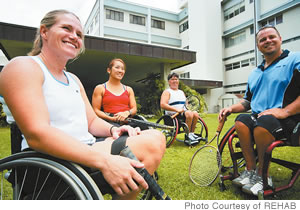Getting Back Into The Game
Interviewed by Melissa Moniz
Wednesday - June 18, 2008
E-mail this story | Print this page | Comments (0) | Archive
 Del.icio.us Share
Del.icio.us Share

Dr. Cedric Akau
Physiatrist
What are your professional titles?
I am the chief of the Department of Sports Medicine and Rehabilitation within the Bone and Joint Center at the Straub Clinic and Hospital and chief of the Division of Physical Medicine and Rehabilitation at the John A. Burns School of Medicine. I am also a member of the medical executive committee at the Rehabilitation Hospital of the Pacific.
Where did you receive your schooling and training?
I am a graduate of the Kamehameha Schools, class of 1973. I have a bachelor’s degree from Whitman College in Washington, where I majored in biology. I have master’s degrees in pharmacology and public health specializing in gerontology from the University of Hawaii. I received a medical degree from the University of Hawaii John A. Burns School of Medicine (JABSOM). I completed my residency in physical medicine and rehabilitation at the University of Michigan.
Do you have an area of specialty?
In my practice at Straub, I treat patients with non-surgical musculoskeletal and peripheral neurological disorders. The primary areas that I specialize in are sports medicine, general musculoskeletal medicine and electrodiagnostic medicine. I see a wide spectrum of patients from the high school volleyball player with a shoulder injury to the young mother with carpal tunnel syndrome all the way to a grandma with her arthritic knee. Like my physiatry colleagues, I try to evaluate the impact of a medical condition on the whole person - medically, socially and emotionally - and help my patients to understand and to take control of their health. I want my patients to get back into the game (maximum functioning) as soon as possible, while also learning how to prevent re-injury.

|
What is a typical day/week like for you?
My practice is predominantly out-patient, and therefore I spend most of my time seeing patients at Straub’s main clinic in Honolulu. I start seeing patients at 7:30 or 8:00 each morning after dropping my girls off at school. I spend most afternoons doing consultations or procedures such as an EMG (electromyogram), NCS (nerve conduction studies) or spinal injections. My partner Dr. Timothy Olderr and I are the team physicians for Punahou, and throughout the school year we conduct a weekly clinic at the school to assess, treat, and triage the athletic injuries. During the football season, we both run from work to the football field to cover the intermediate, junior varsity, and varsity games. Occasionally, I will treat patients in the hospital for conditions such as sciatica, spine and extremity pain. My days and evenings are also filled with meetings including meetings at the Rehabilitation Hospital of the Pacific, Straub, and with the Hawaii Society of PM&R. I also spend a fair amount of time teaching medical students, primary care residents and geriatric fellows.
What has been the biggest advancements within physiatry since you started?
The most significant areas of advancement in our specialty have been in biotechnology and engineering. The prosthetic devices for lower limb amputees have improved to the point that disabled athletes can compete at the traditional Olympic level and patients with spinal cord injuries are now able to voluntarily move their limbs through implantable electrodes. The advancements with computer technology have enabled us to better evaluate peripheral nerve damage, while implantable spinal cord stimulators have “cured” patients with chronic intractable pain. In the area of sports medicine, refined techniques of pre-season conditioning have decreased the incidence of injuries such as anterior cruciate ligament tears in young women. Early active rehabilitation has replaced prolonged rest as treatment towards early return to play.
Can you discuss what your position entails as chief of the division of physical medicine and rehabilitation a the University of Hawaii John A. Burns School of Medicine?
I was recently appointed as chief of this division, a position which is supported by a grant from the Rehabilitation Hospital of the Pacific Foundation. It is with the support of REHAB and JABSOM, that I hope to lead the effort to develop curriculum along with my PM&R colleagues, as well as grow the PM&R clinical faculty. In the long term, I hope that we can increase awareness of the PM&R specialty, while sharing our approach toward improving our patient’s functional capabilities and quality of life.
E-mail this story | Print this page | Comments (0) | Archive
Most Recent Comment(s):













